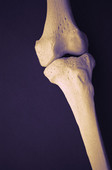Improvements in pain, stiffness, physical function, and in knee joint space width
THURSDAY, March 12, 2015 (HealthDay News) — For patients with knee osteoarthritis, long-term nonsteroidal anti-inflammatory drug (NSAID) use is associated with improvements in symptoms and disease progression, according to a study published in the March issue of Arthritis & Rheumatology.
Kate L. Lapane, Ph.D., from the University of Massachusetts Medical School in Worcester, and colleagues estimated the extent to which short- and long-term NSAID use relieves symptoms and delays structural progression among patients with osteoarthritis of the knee. Changes in the Western Ontario and McMaster Universities Osteoarthritis Index subscales were assessed for 1,846 participants, and joint space width was measured over four years in 1,116 patients. The effects of NSAIDs were estimated using marginal structural modeling.
The researchers found that participants reporting NSAID use at one or two assessments had no clinically important changes compared with those who never reported prescription NSAID use, whereas those reporting use at all three assessments had improvements of 0.88 points in pain, 0.72 points in stiffness, and 4.27 points in function, on average, over the follow-up period. Compared with nonusers, the average change in joint space width was 0.28 mm less for those reporting NSAID use at three assessments. Findings were not clinically or statistically significant for recent NSAID use.
“Long-term, but not short-term, NSAID use was associated with an a priori-defined minimally important clinical change in stiffness, physical function, and joint space width, but not pain,” the authors write.
The study was prepared using an Osteoarthritis Initiative public-use dataset; the OAI was partially funded by pharmaceutical companies. One author disclosed financial ties to the pharmaceutical industry and is listed as inventor on a patent.
Copyright © 2015 HealthDay. All rights reserved.








